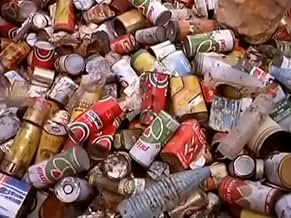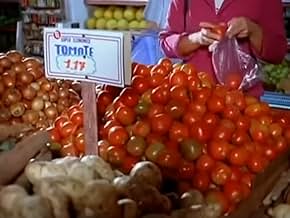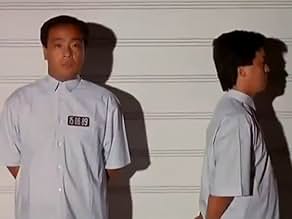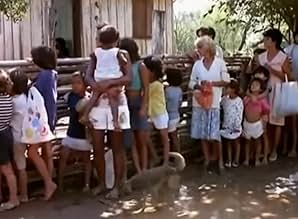Ilha das Flores
- 1989
- 13 मि
IMDb रेटिंग
8.5/10
6.9 हज़ार
आपकी रेटिंग
अपनी भाषा में प्लॉट जोड़ेंA tomato is planted, harvested, transported and sold in a supermarket, but it rots and ends up in the trash. The film follows it to its true end, all to make clear the difference between tom... सभी पढ़ेंA tomato is planted, harvested, transported and sold in a supermarket, but it rots and ends up in the trash. The film follows it to its true end, all to make clear the difference between tomatoes, pigs, and human beings.A tomato is planted, harvested, transported and sold in a supermarket, but it rots and ends up in the trash. The film follows it to its true end, all to make clear the difference between tomatoes, pigs, and human beings.
- निर्देशक
- लेखक
- स्टार
- पुरस्कार
- कुल 4 जीत
फ़ीचर्ड समीक्षाएं
10Trufó
Funny at first, demolishing in the end. When I saw this movie for the first time I spend the first minutes laughing: the editing is fast paced and the voice over explains one after another different concepts that apparently are barely connected. But in the end all grows into a perfectly mounted description of the economical and political aberrations of our times, all in less than 30 minutes.
Here's a work that definitely proves how exciting and questioning a short movie picture can be.
Acting as a director, writer and producer, Jorge Furtado couragely aims a dazzling machinegun at issues as assorted as religion, Holocaust, Brazilian government, poverty, capitalism, and how human intelligence has been used throughout the ages.
Using a dialectical method, and narrating the story in a way that "even a Martian would understand", in the words of the author, the film forges a real cinematographical theorem of Brazilian deplorable situation, borrowing as the stage a neighbourhood in the city of Porto Alegre (one of Brazil's most developed ones, by the way). The degrading scenario, however, would apply to any community on the world in which the effects of money (or its lack) on the lives of its inhabitants are more visible.
In the movie's touching final take, Furtado destroys the bourgeois concept of Freedom, quoting a line from one of Brazil's greatest poetesses, Cecilia Meirelles, and leaves us wondering whether modern 'civilisation' is as far as the human intellect can take us.
Acting as a director, writer and producer, Jorge Furtado couragely aims a dazzling machinegun at issues as assorted as religion, Holocaust, Brazilian government, poverty, capitalism, and how human intelligence has been used throughout the ages.
Using a dialectical method, and narrating the story in a way that "even a Martian would understand", in the words of the author, the film forges a real cinematographical theorem of Brazilian deplorable situation, borrowing as the stage a neighbourhood in the city of Porto Alegre (one of Brazil's most developed ones, by the way). The degrading scenario, however, would apply to any community on the world in which the effects of money (or its lack) on the lives of its inhabitants are more visible.
In the movie's touching final take, Furtado destroys the bourgeois concept of Freedom, quoting a line from one of Brazil's greatest poetesses, Cecilia Meirelles, and leaves us wondering whether modern 'civilisation' is as far as the human intellect can take us.
10jordani
Jorge Furtado needed no more than 13 minutes to prove his theory "there's no God", showed in the beginning of the movie. This movie is as raw as fresh meat and cuts like a knife. No more words to describe. You must see it for yourself. Believe me, after you watch this movie you won't forget it never more.
I'm using my personal VHS copy of this excellent short in my environmental awareness classes for high school, and students are always stroked by its accurate and intelligent issues.It always provides very large and useful discussion about environmental issues.
With a very well humored screenplay and very well balanced use of fiction, documentary and table top animation, this short gives you an overview of what happens in our affluent society with any natural or produced good, with domestic and industrial waste and discussing some very special social issues.
Interesting thing is that this short Ilha days Flores ( Flower Island, in English pronounced Ilya Dass Floresh) it is not outdated, not growing old and unfortunately still shocking when you think of what is happening with all the waste in our society, when people are less important than the profit made.
With a very well humored screenplay and very well balanced use of fiction, documentary and table top animation, this short gives you an overview of what happens in our affluent society with any natural or produced good, with domestic and industrial waste and discussing some very special social issues.
Interesting thing is that this short Ilha days Flores ( Flower Island, in English pronounced Ilya Dass Floresh) it is not outdated, not growing old and unfortunately still shocking when you think of what is happening with all the waste in our society, when people are less important than the profit made.
10thbzcrt
That's the kind of movie you'll see quite by chance, one evening on television. And you will never forget it.
"Ilha das flores" is the story of a tomato, from the field where it is cultivated to the dustbin, and beyond. It's fun, and, at the same time, it tells you a lot about the economy and the Brazilian society. What is really unique for a documentary is that the story is as pleasant to follow as in a fiction, and the end is one of the more stunning and moving end I have ever seen in a movie.
"Ilha das flores" is the story of a tomato, from the field where it is cultivated to the dustbin, and beyond. It's fun, and, at the same time, it tells you a lot about the economy and the Brazilian society. What is really unique for a documentary is that the story is as pleasant to follow as in a fiction, and the end is one of the more stunning and moving end I have ever seen in a movie.
क्या आपको पता है
- ट्रिवियाThe short opens with three short sentences on screen: "Este filme não é um filme de ficção. Existe um lugar chamado Ilha das Flores. Deus não existe." [This film is not a work of fiction. There is a place named Island of Flowers. God does not exist.]
- कनेक्शनFeatures Nazi Concentration Camps (1945)
टॉप पसंद
रेटिंग देने के लिए साइन-इन करें और वैयक्तिकृत सुझावों के लिए वॉचलिस्ट करें
विवरण
- रिलीज़ की तारीख़
- कंट्री ऑफ़ ओरिजिन
- भाषा
- इस रूप में भी जाना जाता है
- Isle of Flowers
- फ़िल्माने की जगहें
- Ilha das Flores, पोर्टो एलेग्रे, रियो ग्रांडे डो सुल, ब्राज़ील(30º 12' 30" S, 51º 11' 21" W)
- उत्पादन कंपनी
- IMDbPro पर और कंपनी क्रेडिट देखें
- चलने की अवधि13 मिनट
- ध्वनि मिश्रण
- पक्ष अनुपात
- 1.37 : 1
इस पेज में योगदान दें
किसी बदलाव का सुझाव दें या अनुपलब्ध कॉन्टेंट जोड़ें





















